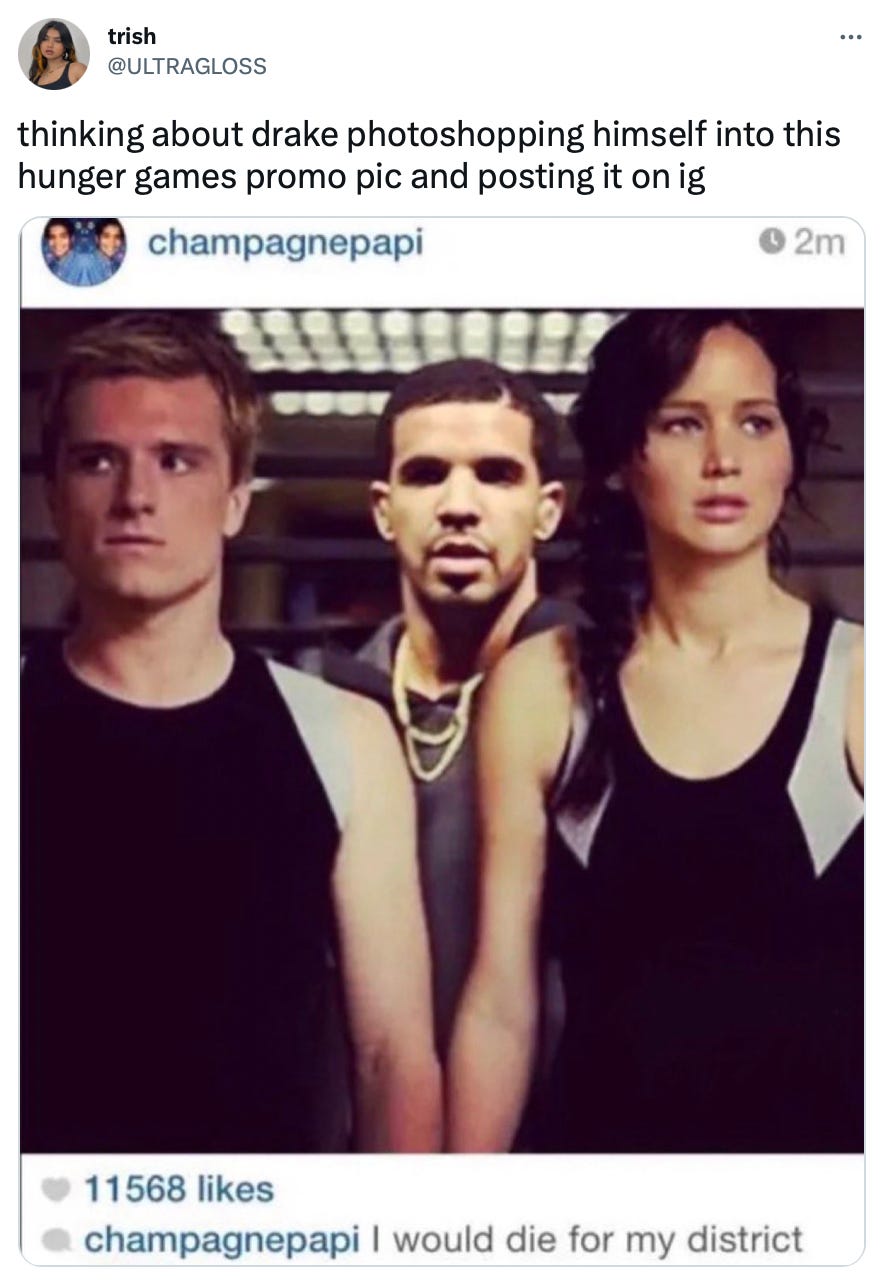The unbearable whiteness of Jack Harlow's 'Jackman.'
Melinda, a reformed Jack Harlow stan, grapples with the latest lackluster studio release from her man.
I often think of Lil Yachty’s charming response in an interview with Joe Budden, who insisted there was no way Yachty could be happy every day as a young person in the music industry. Lil Yachty was dumbfounded. “When you come from a college dorm room with no money, you scamming credit cards and you ain’t getting no play with no girls, you have no clothes, you have no car — and you come to having three or four cars, you have millions of dollars — half a million dollars on your body just to wear — any kind of clothes you want, any hoes you want, how could you be upset?”
This is the kind of attitude that, in part, delivered Jack Harlow to fame’s doorstep quickly.
Harlow is a 25-year-old white rapper and it shows. Sometimes, this is a good thing. His approachable sound, clever lyrics, and cute friend-of-a-friend vibe clicked for people (read: me.) He landed Grammy nominations, major festival gigs, and most recently a lead role in the new White Men Can’t Jump reboot early in his career. After two studio releases, suddenly, Jack Harlow became a household name. It’s difficult not to appreciate a rapper who sounds excited to be where he is, but also isn’t going to be an asshole about it.
I bring up the Yachty moment because, when listening to Harlow’s newest album Jackman., I was shocked at how bored he sounded. It wasn’t long ago that the artist was bouncing through “INDUSTRY BABY” alongside Lil Nas X and the (understandably) overplayed singles “WHATS POPPIN” and “First Class.” As a pop rapper, wasn’t that what he was looking for at the end of the day? In the words of Lil Yachty, how could he be upset?
Yet, he is; on Jackman., he goes in the other direction. After his second studio album, Come Home The Kids Miss You, was dunked on and then forgotten rather quickly, it seems he wants to be taken seriously. But is this the way?
Jackman. lacks real poetry or substance; it reaches for something greater than earlier work but never gets off the airstrip. For example, intro track “Common Ground” gripes about suburbs “filled with ebonics and trap sonics” without ever directly reckoning with his own possible contribution to that paradigm. In a 2021 interview with GQ, Harlow claims that he usually tries to leave whiteness out of his work. “I think what has worked for me is that my music has never been about the fact that I am white. I don’t try to lean into the, ‘Hey, I’m the white boy.’ I try not to make it a novelty,” he said. While Jackman. certainly doesn’t go for novelty, it misses the mark in lyrics that don’t take on race thoughtfully or interestingly enough.
Jack Harlow is Jack Harlow because he’s white. He doesn’t need to defend that or make it mean something more.
“It Can’t Be” is another baffling number that addresses haters who might chalk up Harlow’s success in the rap industry to his white privilege: “It must be my skin / I can’t think of any other reason I’d win,” he raps sardonically. The eye roll–worthy song doesn’t do anything on an emotional level to make listeners sympathize with him. Instead, it drags on about how talented he is, what a good person he is, and how annoyed he is to hear anything to the contrary. And I totally agree with him: Whiteness isn’t the reason for his success. It’s the reason for some small failures in his judgment that cast a big shadow. Jack Harlow is Jack Harlow because he’s white. He doesn’t need to defend that or make it mean something more. He has nothing scathing to say to his haters, nor anything refreshing to say about his position; ultimately, he spends his time unwisely when drawing attention to it in this way.
He suffers from the same half-baked malady in “Gang Gang Gang,” a track that reckons with an experience I imagine plenty of young men go through, but rarely talk about: the conflict and betrayal of finding out that another male friend is not a good person. However, the song doesn’t go anywhere after Harlow experiences the shock of finding out his friends “Marcus” and “Kevin” are sex offenders. They just aren’t friends anymore, I guess. Harlow doesn’t bother telling us much else. The idea of his morality is all the song nudges at, and all he seems to think matters.
To be clear, I’m not arguing that Harlow’s music, or that Harlow himself, is problematic. That’s my man, but he’s making it hard to stick besides him when he puts out blasé work like this.
Take “They Don’t Love It,” a head bobber where he sounds fresh and confident, like the version of himself that the people made famous. Everything’s all fun and games, and then he goes and says he’s “the hardest white boy since the one who rapped about vomit and sweaters.” It’s just like, can we not?
Aside from race, “Blame On Me” is a Family Trauma Dump Track that plays out like a poem in a freshman college workshop. Like, I am sorry you went through that, Jack the Jock who was required to take this class to graduate. I would not have known that about you, but also I am left with more questions than answers. On “No Enhancers,” a track with a smooth, romantic melody that is otherwise wasted, we don’t get a real glimpse at the girl in question beyond the fact that she’s naturally beautiful and takes oral birth control. I thought we were getting confessional?
Lately, male rappers are too afraid to make songs for me and my friends to shake our asses to.
As someone who struggles to believe Harlow’s most prominent co-signer, Drake, has ever put a hit out on anyone, I can respect that Jack Harlow doesn’t pretend to be anything he’s not. The decision to put out a project that touches on bigger topics than girls and money is an admirable one. It could’ve been an interesting one, too, but Harlow’s sullied faith in himself leaves a more significant mark.
The confessional nature “Questions” and “Ambitious” makes the songs feel like rough drafts — honest, but unpolished. On “Denver,” one of the better tracks on the album, Harlow says the quiet part out loud: “Nemo said to keep my foot on necks / cause I can’t let ‘em just forget me / But the brags in my raps are getting less and less convincing.” Okay, then don’t let us forget you! Lately, male rappers are too afraid to make songs for me and my friends to shake our asses to. It’s not right! If you’re going to grapple with insecurities and the pitfalls of fame, I want it to be juicy and I want it to be provocative. “But deep down, I find myself wondering / if the people that write about me are right about me,” he wonders on “Denver.” Well… Pitchfork’s 6.4 is nicer than I would’ve been here.
The ways in which the criticism of his sophomore slump have affected the rapper are woven into the backdrop of Jackman. And I feel for him! But Harlow’s response to the critics comes off less like introspective, I’ll-prove-them-wrong-Drake, and more defeatist than one would hope to hear so early in his career. Not everyone can be Lil Yachty. That’s understandable. But it’s too soon to sound this unsure. The confidence that brought Jack Harlow so much attention previously is missing from this album. If he’s out on himself, I’ll take his word for it.
Hunter-gatherer corner
What we’ve read and DMed each other about lately — our internet bounty is below!
“It’s Time to Embrace the Era of Mid Entertainment” by Kaitlyn Greenidge - Harper’s Bazaar — Anyone who knows me knows I love mid entertainment. Greenidge writes: “People are reluctant to declare things mid because of the fear of being branded a snob.” We need to believe that we like what we like because “we all have unique, eclectic tastes that signal both our intelligence and the fact that we don’t take ourselves too seriously.” Greenidge pushes back against this idea and creates space for the not-great-not-horrible content that she (and I) love in this smart piece. — LM
“The Baby Name Boom” by Rebecca Jennings - Vox — Creativity can be a curse. In this piece on “baby name consultants,” I am reminded that sometimes we as a society need to leave good enough alone, otherwise we end up with people named things like “Taylee, McKarty, Nayvie, Maylee, and Lakynn.” — LM
“Jordan Neely Just Needed Some Help” by Albert Burneko - Defector — The murder of Jordan Neely on the subway in New York is so upsetting and sad. I can’t articulate the inhumanity of it all as well as Albert Burneko did for Defector: “Sometimes you have something that somebody else needs more than you do, and you can afford to spare it, and the easiest thing in the world is just to give it to them. In that moment, to have what you can give them is, itself, a gift, a thing to be thankful for. In my lifetime this society has seemed ever more fanatically opposed to that possibility, and ever more committed to the idea that of all the things a vulnerable person might legitimately need, help — simple material help — is never one of them.” — MF
Why Not?
Why Not? is our biweekly list of recommendations. Think recipes, gift guides, podcasts, clothes, and anything we consider to be generally chic. Have a suggestion? Let us know!
Garlicky Chicken Thighs with Scallion and Lime - NYTimes Cooking — I wouldn’t say this recipe is super special except for the fact that it’s literally the only way I cook chicken thighs these days — so I guess that’s something! I throw in a can of chickpeas toward the end. — LM
Crumb Couture perfume - Snif — I’ve been buying a lot of perfume lately, and this offering from Snif had me intrigued, so it’ll be mine in 4-5 weeks (it’s currently available for pre-order.) I love gourmand scents, and the idea of smelling like a jammy croissant seems like a fun pick-me-up for future me. — MF
If you liked this issue, write a song about it! Tell us your thoughts in the comments or on Twitter (@lillymilman | @melindafakuade), and share it with the hardest white boy you know.



